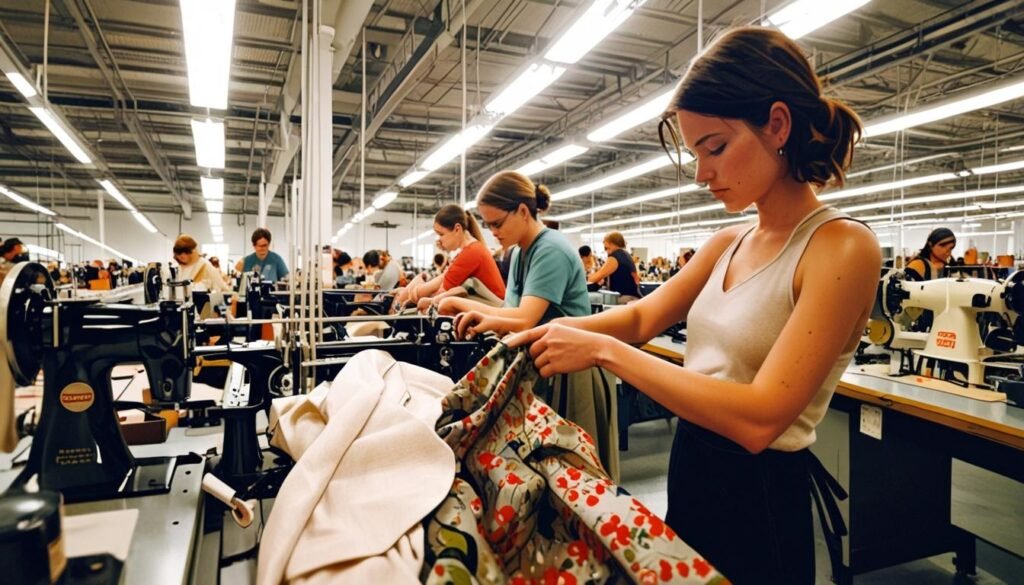**New York**: The fashion industry is undergoing significant changes as US tariffs spark both challenges and opportunities. While some brands embrace the shift to domestic production, others face declining sales amid rising costs and shifting consumer priorities in a turbulent economic climate.
The announcement of retaliatory tariffs by US President Donald Trump earlier this month triggered significant upheaval in the fashion industry, leading to varied responses among apparel manufacturers. For some, particularly those focused on domestic production, it was perceived as an opportunity rather than a challenge. Bayard Winthrop, founder and CEO of American Giant, articulated this sentiment, expressing support for the tariffs as a long-overdue response to what he described as a detrimental global trading approach. Speaking to The Business of Fashion, Winthrop noted, “For 40 years, we’ve been going after this unfettered globalised approach to trade, which I think has been really bad for the country … I’m generally a fan of efforts to address that.”
American Giant, established 14 years ago and operating its own manufacturing facility in North Carolina, exemplifies a segment of US-based brands that produce the majority of their goods domestically. These companies are positioned to benefit from tariffs on imported clothing, which remain significant, particularly from China, America’s major trading partner. Despite Trump’s recent decision to delay the peak tariff increase for three months, many brands producing overseas are still vulnerable to rising costs. In contrast, American manufacturers stand to gain a competitive advantage, particularly if they effectively communicate their commitment to domestic production to consumers.
However, challenges persist. As consumer sentiment dips amidst heightened tariff uncertainty and recession fears, brands that pride themselves on American-made products face potential declines in international sales, especially as reciprocal tariffs could disrupt global commerce. Lyndie Benson, founder and CEO of knitwear brand Bleusalt, mentioned to The Business of Fashion that the company has experienced a staggering 50% drop in sales in Canada as local customers shift their purchases to national brands. Furthermore, companies like Target have faced backlash when perceived as endorsing the administration’s policies, leading to a decline in foot traffic.
To navigate this landscape, American-made fashion labels are adopting strategies to enhance consumer engagement without taking political stances. Brian Ehrig, a partner at management consultancy Kearney, suggested that conveying the benefits of locally made products is crucial. “Those that have made the investment to figure out how to do all of that in the US, there is a compelling story behind that to help people understand the value chain,” he noted.
Despite the tariff challenges, the realities of producing apparel in the US present inherent obstacles. Labour costs and material prices in the domestic market are significantly higher than in countries like China and Vietnam. The lack of skilled workers further complicates the landscape for many brands. However, those that can manufacture locally, like westernwear brand Filson, are experiencing positive outcomes. Filson has reported a surge in sales after promoting its “Made in USA” offerings, with Tim Bantle, the company’s president, indicating that four of its top ten best-selling styles this month were American-made.
Gurkha, a luxury accessory maker, has not fully shifted its manufacturing to the US but has begun producing wine cases domestically to improve quality control and reduce logistics costs. President Robert Williams expressed a calculated caution about the necessity of such moves, stating, “We’re not being reactionary. We’re in a pretty good position compared to 99 percent of the brands in the world.”
Industry experts like Sonia Lapinsky from consultancy AlixPartners emphasised that smaller brands often attract niche markets with their American-made products, and the current tariff landscape presents an opportunity for these entities to broaden their appeal. Filson, for example, is organising tours of its Seattle manufacturing facility to showcase its production process directly to consumers.
Moreover, online retailer At Present highlights its US-made jewellery selections prominently on its platform, encouraging customers to connect with the artisans behind the products. Founder Marc Bridge noted that telling the emotional stories of the makers is more impactful than simply displaying American flags on their website.
In addition to promoting their own products, some American-made brands are extending their knowledge to larger companies eager to explore domestic manufacturing. American Giant has collaborated with Walmart to produce a line of affordable t-shirts made from locally sourced cotton, and Winthrop expressed hope that brands will seize this moment as an opportunity for leadership rather than react against perceived threats.
Through these various strategies, the American fashion industry is navigating a complex landscape shaped by tariffs, consumer sentiment, and the broader implications of producing domestically.
Source: Noah Wire Services





